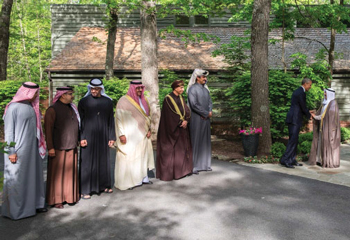U.S. hosts arms bazaar at White House Arab Summit
By Thalif Deen | Last updated: May 26, 2015 - 6:17:57 PMWhat's your opinion on this article?

President Barack Obama shakes hands with His Highness Sheikh Sabah Al-Ahmad Al-Jaber Al Sabah, Amir of the State of Kuwait, as Gulf Cooperation Council (GCC) leaders prepare to have a group photo with the President outside of the Laurel Cabin at the conclusion of a summit meeting at Camp David, Md., May 14. Photo: Official White House Photo/Pete Souza
|
But against the backdrop of a recent White House summit meeting of Arab leaders at Camp David, the administration of President Barack Obama confessed it has dispensed with rule number two.
According to Colin Kahl, national security advisor to Vice-President Joe Biden, the United Arab Emirates (UAE) flies the most advanced U.S.-made F-16 fighter planes in the world.
“They’re more advanced than the ones our Air Force flies,” he told reporters at a U.S. State Department briefing, without going into specifics.
The six members of the Gulf Cooperation Council (GCC)—Bahrain, Oman, Kuwait, Qatar, UAE and Saudi Arabia—which participated in the summit were, not surprisingly, promised more weapons, increased military training and a pledge to defend them against missile strikes, maritime threats and cyberattacks from Iran.
An equally important reason for beefing up security in the region is to thwart any attacks on GCC countries by the Islamic State of Iraq and Syria (ISIS).
“I am reaffirming our ironclad commitment to the security of our Gulf partners,” President Obama told reporters at a news conference, following the summit May 14.
But he left the GCC leaders disappointed primarily because the United States was not willing to sign any mutual defense treaties with the six Arab nations—modeled on the lines of similar treaties U.S. has signed with Japan and South Korea.
Still, Bahrain, Egypt, Israel, Jordan and Kuwait (along with Pakistan) are designated “major non-NATO (North Atlantic Treaty Organization) allies.”
Mr. Kahl told reporters: “This administration has worked extraordinarily closely with the Gulf states to make sure they had access to state-of-the-art armaments.”
He said that although the U.S. has not entertained requests for F-35s, described as the most advanced fighter plane with the U.S. Air Force, “but keep in mind under this administration we moved forward on a package for the Saudis that will provide them the most advanced F-15 aircraft in the region.”
Taken as a whole, Mr. Kahl said, the GCC last year spent nearly $135 billion on their defense, and the Saudis alone spent more than $80 billion.
In comparison, the Iranians spent something like $15 billion on their defense, said Mr. Kahl, trying to allay the fears of GCC countries, which have expressed strong reservations about an impending nuclear deal the U.S. and other big powers are negotiating with Iran.
Still, arms suppliers such as France and Britain have been feverishly competing with the United States for a share of the rising arms market in the Middle East, with continued turmoil in Iraq, Syria, Libya and Yemen.
Pieter Wezeman, senior researcher, Arms and Military Expenditure Program at the Stockholm International Peace Research Institute, told IPS that GCC countries have long procured weapons from both the U.S. and several European countries.
Qatar is probably the one country in the GCC where U.S. military equipment makes up a low share of its military equipment and instead it has been more dependent on French, British and other European arms, he pointed out.
Last year, Qatar ordered a large amount of new arms from suppliers in Europe, the U.S. and Turkey, in which U.S. equipment was significantly more important than it had been in the decades before in Qatari arms procurement.
“None of the GCC countries has been mainly dependent on a single arms supplier in the past four to five decades. The U.S., UK and France have long been the main suppliers to the GCC, competing against each other,” he added.
In an article on the GCC summit, William Hartung, director of the Arms and Security Project at the Center for International Policy and a senior advisor to the Security Assistance Monitor, described it as “an arms fair, not diplomacy.”
He said the Obama administration, in its first five years in office, entered into formal agreements to transfer over $64 billion in arms and defense services to GCC member states, with about three-quarters of that total going to Saudi Arabia.
He said items on offer to GCC states have included fighter aircraft, attack helicopters, radar planes, refueling aircraft, air-to-air missiles, armored vehicles, artillery, small arms and ammunition, cluster bombs, and missile defense systems.
On any given day, Mr. Kahl said, the United States has about 35,000 U.S. forces in the Gulf region.
Mr. Wezeman said access to certain technology has occasionally been one of several reasons for the GCC countries turning to Europe, as the United States tried to maintain a so-called ‘Qualitative Military Edge’ for Israel, in which it refused to supply certain military technology to Arab states which was considered particularly threatening to Israel.
The writer can be contacted at [email protected].
INSIDE STORIES AND REVIEWS
-
-
About Harriett ... and the Negro Hollywood Road Show
By Rabiah Muhammad, Guest Columnist » Full Story -
Skepticism greets Jay-Z, NFL talk of inspiring change
By Bryan 18X Crawford and Richard B. Muhammad The Final Call Newspaper @TheFinalCall » Full Story -
The painful problem of Black girls and suicide
By Charlene Muhammad -National Correspondent- » Full Story -
Exploitation of Innocence - Report: Perceptions, policies hurting Black girls
By Charlene Muhammad -National Correspondent- » Full Story -
Big Ballin: Big ideas fuel a father’s Big Baller Brand and brash business sense
By Bryan Crawford -Contributing Writer- » Full Story






 Click Here Stay Connected!
Click Here Stay Connected!








